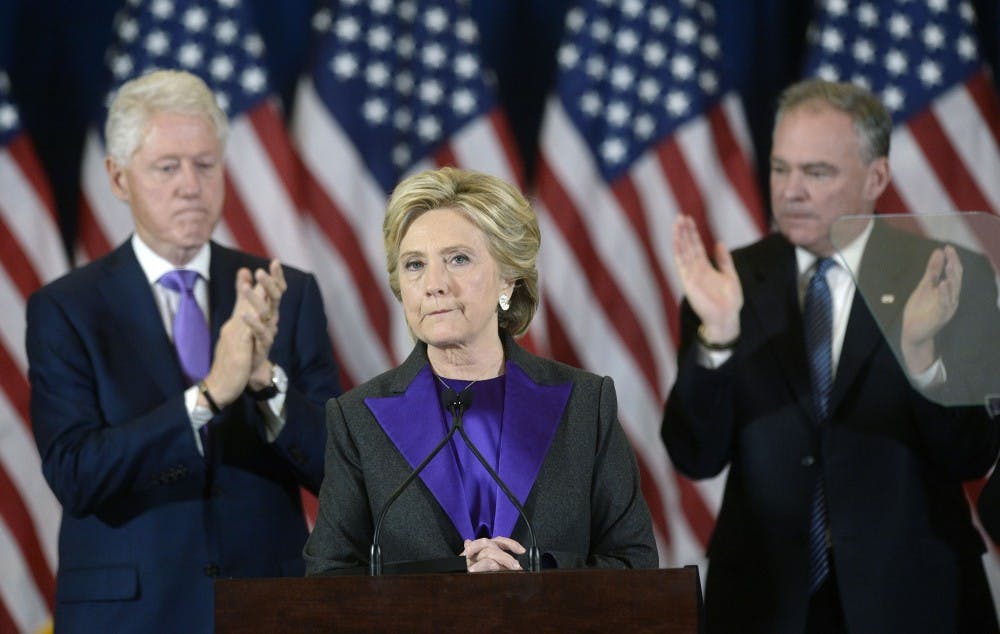List of presidential candidates who won the popular vote but lost the presidency
- Andrew Jackson in 1824 (lost to John Quincy Adams)
- Samuel Tilden in 1876 (lost to Rutherford B. Hayes)
- Grover Cleveland in 1888 (lost to Benjamin Harrison)
- Al Gore in 2000 (lost to George W. Bush)
Information from FactCheck.org .
Hillary Clinton won the popular vote by 0.2 percent — a slim margin, but still a win.
According to NPR, Clinton had about 47.7 percent of the popular vote as of Nov. 10, while Trump had 47.5 percent.
The actual numbers are 59,938,290 votes for Clinton and 59,704,886 votes for Trump, according to an NPR article at the time it was published. That’s a win by 233,404 votes.
Clinton is the fifth presidential candidate to win the popular vote but lose the election. The most recent instance before now was in 2000, when Al Gore lost to George W. Bush with 48.4 percent of the popular vote compared to Bush’s 47.9 percent.
In Delaware County, Trump won 24,217 votes, or 53.3 percent. Clinton won 18,100 votes, or 39.8 percent.
When the Daily News conducted its election poll, 58.1 percent of students said they would vote for Clinton and 22 percent said they would vote for Trump.
Alexis Lemons, a sophomore international business major, voted for Clinton. Although she didn’t agree with all of the policies Clinton proposed, she holds out hope that Clinton may still become president.
“She was definitely cheated by the system, because she was the popular vote,” Lemons said. “Personally, I don't think we should say she is the loser yet. The actual electoral college doesn't vote until December and 21 states are not bound to vote how their state votes. There is still a glimmer of hope left until December.”
Lemons was originally a Bernie Sanders supporter, but said Clinton was the “next best thing” after Sanders lost the in the primaries.
“She's the most qualified of the three major parties,” Lemons said. “She isn't in the midst of multiple lawsuits, one of those being for rape, and she is knowledgeable of the world outside of the U.S.”
Third-party candidates Gary Johnson, Jill Stein and Evan McMullin failed to win any electoral votes — a trend that’s been going since 1968. However, even with a combined total of 4 percent of the vote, they did have an impact on the election.
For example, Trump beat Clinton in Florida by 119,770 votes, according to the New York Times. However, Johnson and Stein won a combined total of 270,026 votes, meaning Clinton could have won the battleground state if they had not been in the race.
A similar case happened in 2000, when Green Party candidate Ralph Nader took almost 100,000 votes in Florida — and Gore lost the state by 537.
In Delaware County, Johnson was the only third-party presidential candidate on the ballot. He had 2,382 votes, or 5.25 percent.
Johnson’s actual numbers are less than in the Daily News poll, which showed about 8.4 percent of students voting for him. About 3.6 percent of students polled said they would vote for Stein.
The prospect of a third-party candidate having success was more likely this year, as many people expressed dissatisfaction with their choices.
In September, Pew Research Center found 63 percent of registered voters were “not too or not at all satisfied.” That was a 7 percent drop since June.
Lacey Pamer, a sophomore public relations and creative writing major, also voted for Clinton. Although Pamer said she wasn’t a fan of Clinton’s foreign policy, she was happy with her as a candidate overall.
“Mostly the driving force for my preference of her was how much I hate Trump. He only speaks hate and I cannot stand by that. To me, he only values straight, white males,” Pamer said. “Now that Hillary has lost, I feel numb and my stomach hurts. I am afraid for all of my friends who are not straight, white males.”





